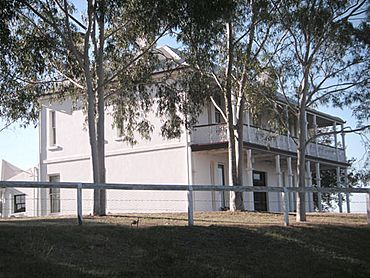Blair Athol, New South Wales facts for kids
Quick facts for kids Blair AtholSydney, New South Wales |
|||||||||||||||
|---|---|---|---|---|---|---|---|---|---|---|---|---|---|---|---|

Blair Athol House
|
|||||||||||||||
| Population | 2,725 (2021 census) | ||||||||||||||
| Established | 1992 | ||||||||||||||
| Postcode(s) | 2560 | ||||||||||||||
| Location | 57 km (35 mi) SW of Sydney | ||||||||||||||
| LGA(s) | City of Campbelltown | ||||||||||||||
| State electorate(s) | Campbelltown | ||||||||||||||
| Federal Division(s) | Macarthur | ||||||||||||||
|
|||||||||||||||
Blair Athol is a friendly suburb located in Sydney, New South Wales, Australia. It is about 57 kilometers (around 35 miles) southwest of the main Sydney central business district. This area is part of the City of Campbelltown and is known for its quiet, family-friendly feel. It belongs to the wider Macarthur region.
Contents
How Blair Athol Began
British settlers started moving into this area in the early 1800s. They set up farms and grew fruit in the rich soil.
The Blair Athol Homestead
A Scotsman named John Kidd built the original Blair Athol homestead in 1879. He named it after a village called Blair Atholl in Scotland. The next year, John Kidd became a member of parliament for the area. This meant he helped make laws and decisions for the community. He held this important job until 1904.
From Farms to Homes
In 1945, the land was sold to an engineering company. They wanted to build a factory there. The Campbelltown Council changed the land's purpose to industrial. They hoped other factories would also move in. However, most of the land stayed empty. In 1992, the Council changed the land's purpose back to residential. This is when the modern suburb of Blair Athol was created.
Who Lives in Blair Athol?
The 2021 census is a survey that counts people and gathers information about them. It showed that 2,725 people live in Blair Athol.
Where People Are From
- About half (50.3%) of the people in Blair Athol were born in Australia.
- Many residents also come from other countries.
- The most common countries of birth include the Philippines (9.1%), India (5.7%), Fiji (3.2%), Laos (2.9%), and New Zealand (2.2%).
Languages Spoken
- Most residents (46.7%) speak only English at home.
- Other languages spoken include Arabic (6.3%), Tagalog (5.9%), Hindi (4.8%), Lao (3.3%), and Malayalam (3.0%).
Religions
- The most common religion in Blair Athol is Catholic (30.9%).
- Many people also reported having no religion (15.3%).
- Other religions include Islam (12.2%), Buddhism (7.2%), and Anglican (6.8%).
 | John T. Biggers |
 | Thomas Blackshear |
 | Mark Bradford |
 | Beverly Buchanan |


